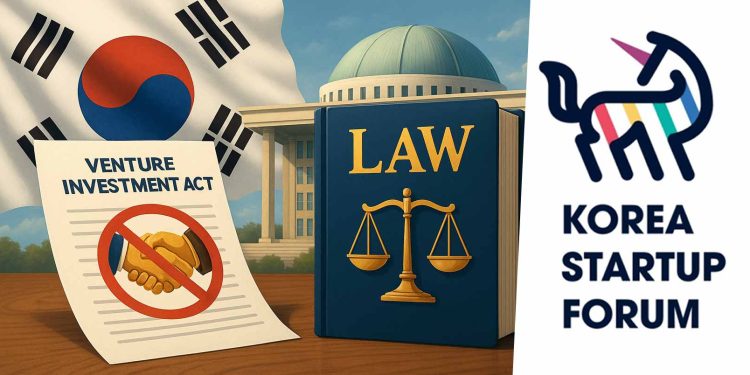Korea’s startup ecosystem is entering a turning point in how it defines responsibility and risk. By eliminating founder joint liability in venture investments, the government is not only reshaping legal foundations but also signaling a deeper shift toward a culture that values innovation over fear of failure. This new Venture Investment Act amendment marks a decisive recalibration of partnership, accountability, and trust for both founders and investors.
National Assembly Advances Founder Protection Under the Venture Investment Act
On November 21, the Venture Investment Promotion Act (VIPA) amendment passed the National Assembly’s Industry, Trade, and SMEs Committee, introducing a legal ban on clauses that make startup founders personally responsible for company debts under venture investment contracts.
The amendment, welcomed by the Korea Startup Forum (KOSPO) on November 26, elevates what had previously been an administrative guideline into binding law. It also prohibits venture capital firms, individual investment associations, and startup accelerators from demanding joint liability through investment agreements.
This legislative change effectively dismantles a structural barrier that long discouraged entrepreneurs from re-entering the startup scene after failure, ensuring that founders are no longer personally burdened by their companies’ financial setbacks.
New Venture Investment Act: Restoring Fair Risk Distribution and Founder Confidence
Since 2014, the Korean government has progressively relaxed founder liability rules for financial institutions, expanding exemptions through 2018 to include policy finance agencies. However, loopholes remained in private venture contracts, where some investors continued to require joint liability under the guise of investment protection.
Under the new amendment, such practices are explicitly banned, ensuring that risk is shared according to investment principles rather than imposed unilaterally on founders. This represents a significant realignment of Korea’s venture culture — restoring the foundational notion that investment should involve shared risk and reward between both parties.
Korea Startup Forum Welcomes Turning Point in Venture Governance
In a formal statement, KOSPO Chair Han Sang-woo described the bill as “a real institutional change that removes one of the biggest structural obstacles preventing entrepreneurs from trying again.”
KOSPO emphasized that the legal ban will help establish a genuine “re-challenge ecosystem,” where a single business failure no longer translates into lifelong debt. The organization stated,
“The belief that failure does not define a lifetime will encourage more talented individuals to pursue entrepreneurship, which in turn will enhance the vitality of Korea’s innovation ecosystem.”
It also underscored that the reform reinforces a healthier venture culture, “where founders and investors act as true partners, sharing both risks and outcomes.”
Toward a More Balanced Venture Environment
While the amendment operates under the Venture Investment Promotion Act, it also aligns with the government’s broader venture policy direction — particularly ongoing efforts to streamline Korea’s dual venture investment framework managed by the Ministry of SMEs and Startups (MSS) and the Financial Services Commission (FSC).
Korea’s venture ecosystem currently functions under two parallel licensing regimes: the MSS-led Venture Investment Promotion Act and the FSC’s Specialized Credit Finance framework. The recent amendment applies only to the MSS system, which oversees startup accelerators and venture investment companies.
Comparable updates have yet to be introduced within the FSC-regulated finance segment, where credit-linked venture entities remain exposed to higher risk structures. This divergence highlights Korea’s continuing challenge of harmonizing its dual venture frameworks to ensure consistent protection and balanced risk across all startup funding channels.
This reform also complements ongoing work to clarify fund governance, reduce founder vulnerability, and create a more transparent and predictable investment climate. Together, these efforts support the Third Venture Boom agenda — building a startup ecosystem where risk-taking is rewarded, not punished.
By protecting founders’ legal standing, the government is reinforcing Korea’s push toward a founder-friendly venture culture, one that aligns with global norms while maintaining investor accountability.
Korea’s Next Phase of Innovation: Shared Risk and Sustainable Growth
The end of founder joint liability symbolizes a cultural shift in Korea’s innovation economy. The new legal foundation recognizes that entrepreneurship depends on resilience and fair risk-sharing, not personal collateral.
As the new venture Inv amendment moves toward full enforcement, Korea’s startup landscape stands to gain a stronger base of trust, openness, and long-term growth — the very conditions needed for its venture ecosystem to mature into a globally competitive model.
🤝 Looking to connect with verified Korean companies building globally?
Explore curated company profiles and request direct introductions through beSUCCESS Connect.
– Stay Ahead in Korea’s Startup Scene –
Get real-time insights, funding updates, and policy shifts shaping Korea’s innovation ecosystem.
➡️ Follow KoreaTechDesk on LinkedIn, X (Twitter), Threads, Bluesky, Telegram, Facebook, and WhatsApp Channel.






